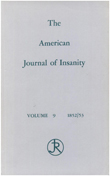Genetic association of the HLA DRB1 gene locus on chromosome 6p21.3 with schizophrenia
Abstract
OBJECTIVE: The authors investigated the human leukocyte antigen (HLA) DRB1*04 gene in schizophrenic patients because it is positively associated with rheumatoid arthritis, an autoimmune disease that exhibits a strong negative association with schizophrenia. The HLA DQB1*0602 allele was also studied because of previous reports of genetic association between it and schizophrenia. Maternal HLA was investigated because of the reported association between prenatal influenza and schizophrenia and the central role of HLA molecules in the immune response to viral infections. METHOD: Polymerase chain reactions and sequence-specific oligonucleotide probes were used to genotype 94 unrelated patients with DSM-III-R schizophrenia, 92 mothers of schizophrenic offspring who were not related either to each other or to the 94 patients, and 177 healthy comparison subjects. RESULTS: The frequency of DRB1*04 alleles was significantly lower in both the schizophrenic patients and the unrelated mothers of schizophrenic offspring than in the healthy comparison subjects. No significant differences were found for DQB1*0602. CONCLUSIONS: DRB1*04 alleles may partially account for the genetic predisposition to schizophrenia. The association reported here may be explained by genetic linkage or by an autoimmune pathophysiology for a proportion of schizophrenia cases. Alternatively, it may be that maternal B lymphocytes that do not express the DR4 antigen encoded by DRB1*04 respond to influenza virus by producing antibodies that perturb neurodevelopment, thus underpinning a proportion of schizophrenia cases.
Access content
To read the fulltext, please use one of the options below to sign in or purchase access.- Personal login
- Institutional Login
- Sign in via OpenAthens
- Register for access
-
Please login/register if you wish to pair your device and check access availability.
Not a subscriber?
PsychiatryOnline subscription options offer access to the DSM-5 library, books, journals, CME, and patient resources. This all-in-one virtual library provides psychiatrists and mental health professionals with key resources for diagnosis, treatment, research, and professional development.
Need more help? PsychiatryOnline Customer Service may be reached by emailing [email protected] or by calling 800-368-5777 (in the U.S.) or 703-907-7322 (outside the U.S.).



